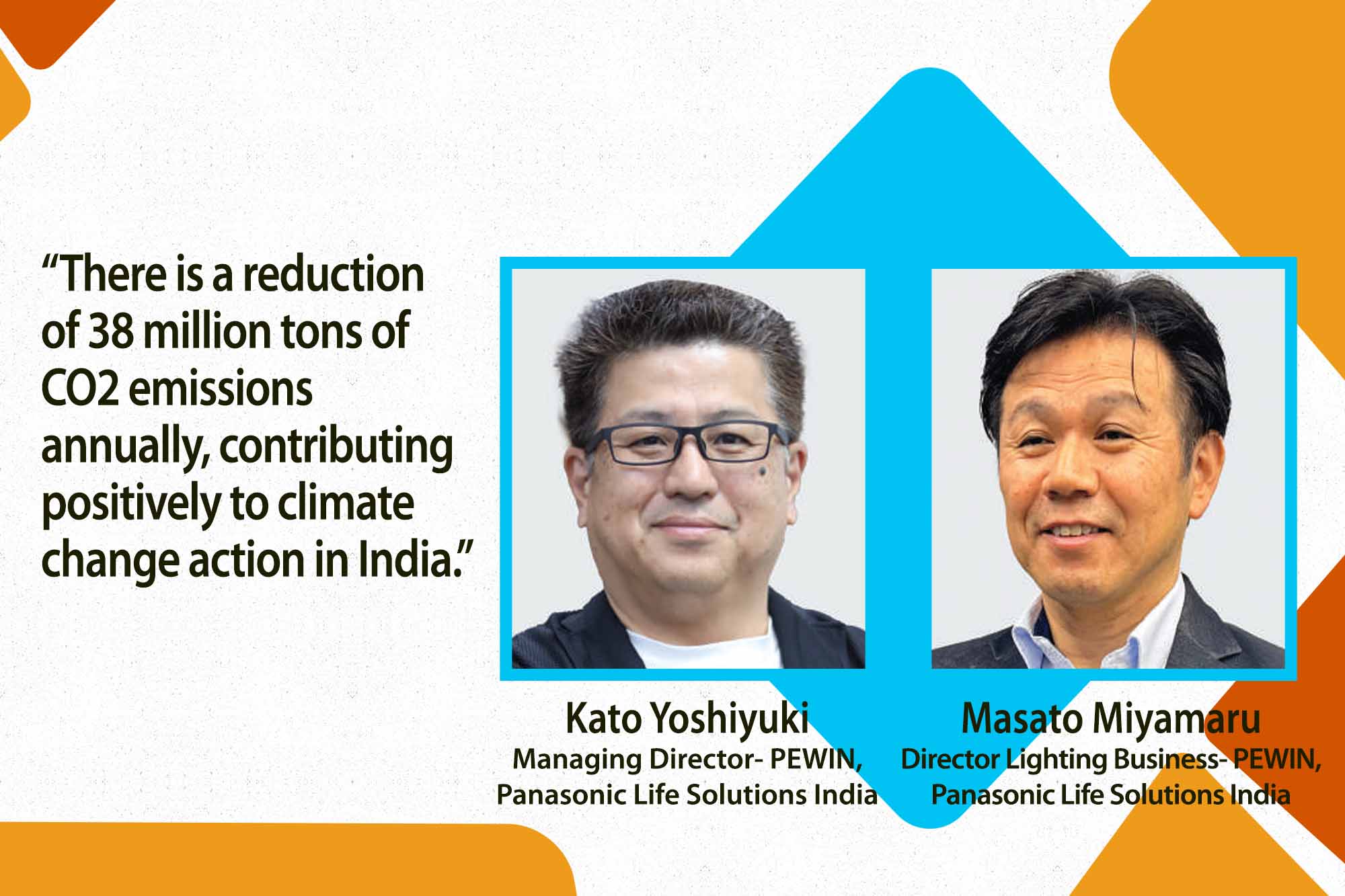LED lighting to grow 130-fold in 5 years
By EPR Magazine Editorial January 23, 2024 11:54 am IST
By EPR Magazine Editorial January 23, 2024 11:54 am IST

There is a reduction of 38 million tons of CO2 emissions annually, contributing positively to climate change action in India.
In pursuing a sustainable and eco-friendly future, Panasonic Life Solutions India actively engages in green initiatives and contributes to national efforts. Through innovative energy-efficient products and alignment with government schemes like UJALA, the company addresses environmental concerns and plays a pivotal role in enhancing the country’s economic and social landscape. Panasonic Life Solutions India leaders analyse the green initiatives undertaken by the industry in compliance with government standards with EPR Magazine.
What initiatives do you offer in the evolving green technology aligning with global trends and the Indian power sector?
Kato Yoshiyuki:
The government has launched several energy, safety, and environmental initiatives. The fact that we are accountable for the environment has become a critical concern for both the government and the general public. As PEWIN, we are actively pushing for greener initiatives, from installing solar panels at every plant to ensuring energy-saving measures. We have focused on maintaining a clean energy-based manufacturing system, which has already been implemented at our Haridwar, Daman, Kutch, and Sri City plants.
India is currently working on reducing plastic waste and utilising other energy-saving measures in the face of increasingly stringent regulations to protect the environment. Simultaneously, we vigorously promote energy-saving activities like reducing compressed energy consumption with an intelligent airflow controller. Replacement of old motors with Energy efficient motors, modification of Cooling tower piping with energy efficient pump with carbon footprint reduction of more than 4500 tons approximately in FY-23.
We continue to take CO2 and environmental preservation into account during the post-production phase in addition to the production side. We have introduced the strategy from a supply chain management standpoint, prioritising people, cost, and service. By 2030, we want to lead the ECM category as the leading supply chain management firm through process improvement and digitisation.
Using data insights from deployed digital tools, SCM is concentrating on sustainability, digitalisation, and process improvement. By combining cargoes, we have removed the need for smaller trucks, limiting the number of trucks that travel and have lowered CO2 emissions. Increasing truck capacity from 90 percent to 95 percent has reduced truck movement on the road, ultimately reducing CO2 emission. Both these two activities have helped the company to reduce 21,300 KGs CO2 emission.
How do government schemes like UJALA influence firms like Panasonic Life Solutions?
Masato Miyamaru:With such strong policy support from the government, it has boosted the domestic lighting industry by encouraging Make-in-India manufacturing of LED bulbs, whose production has increased from 1 lakh per month to 40 million per month since the scheme’s launch. The surge in demand led to a remarkable 130-fold increase in Indian LED lighting sales over five years.
The UJALA programme’s success has paved the way for even broader transformations. It expanded to include LED bulbs (36.86 cr), LED tube lights (72.18 lakhs), fans (23.59 lakhs), and the “Street Lighting National Programme”(SLNP). UJALA has opened the doors for large-scale energy efficiency implementation in the country, highlighting that energy efficiency can yield significant benefits across various sectors quickly.
In terms of electrical equipment production, how does your company contribute to national efforts to ease people’s lives?
Masato Miyamaru:
PLSIND contributes to the Green India initiative by introducing energy-efficient products to reduce the country’s carbon footprint. We saw a reduction of 38 million tons of CO2 emissions annually, contributing positively to climate change action in India.
By implementing the Make in India initiative, PLSIND decreased the dependence on imports, improving the domestic economy overall. It helped increase employment opportunities in the market. With growing demands for products from Panasonic, vendors are forced to appoint good-quality workers. At the same time, it helped Panasonic negotiate better costs with the vendors using the volume muscle and made it more accessible to a wider range of consumers. It helped Panasonic to improve the productivity of their vendors by upgrading the skill sets of local workers.
By utilising breakthrough technology, Panasonic may provide outstanding quality items at a very low price. As a result, consumers receive high-quality products at a reasonable price. We strive for a life in which everyone is healthy and vibrant. Adapting to changes in sociocultural surroundings and habits, we are committed to consistently improving our technology for the greater good and assuring the highest level of customer satisfaction.
Spokespersons:
Kato Yoshiyuki, Managing Director- PEWIN, Panasonic Life Solutions India
Masato Miyamaru, Director Lighting Business- PEWIN, Panasonic Life Solutions India
We use cookies to personalize your experience. By continuing to visit this website you agree to our Terms & Conditions, Privacy Policy and Cookie Policy.